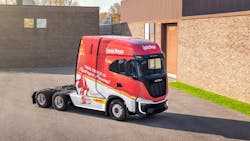DHL Supply Chain and Diageo North America roll out hydrogen fuel cell trucks
DHL Supply Chain and Diageo North America, a premium drinks company, have announced plans to incorporate two hydrogen fuel cell electric trucks into their U.S. fleet. The Class 8 trucks, manufactured by Nikola Corporation, will be deployed and fueled with a Hyla modular refueler at the Diageo campus in Plainfield, Illinois, marking a milestone for the state.
The hydrogen fuel cell electric trucks are part of a broader sustainable supply chain strategy that has included the use of battery electric vehicles, optimizing vehicle usage and routes, shifting to a multimodal approach, and increased use of U.S. EPA SmartWay partner carriers. These efforts have resulted in year-over-year reductions in carbon dioxide emissions for both Diageo and DHL.
"We are thrilled to integrate Nikola's hydrogen fuel cell electric trucks into our U.S. fleet," said Jim Monkmeyer, president of transportation, DHL Supply Chain. "As a global logistics company with the goal of decarbonizing its business, we’ve integrated sustainability as a fourth strategic bottom line named 'Green Logistics of Choice' in our newly announced Strategy 2030. The deployment of these fuel cell electric vehicles is one of many initiatives that demonstrates how we are putting action behind our words.”
See also: Nikola CEO: “We're all in, and there's no turning back.”
Nikola's hydrogen fuel cell electric trucks offer a sustainable and efficient alternative to traditional diesel-powered vehicles.
- The trucks use fuel cell technology to convert hydrogen into electricity, powering the vehicle's electric motors and providing up to 500 miles in range on a single fill.
- Replacing two diesel trucks with fuel cell electric vehicles is expected to reduce 80% of carbon emissions over a year.
- The trucks produce no tailpipe emissions, contributing to cleaner air and reduced greenhouse gas emissions.
- The switch from diesel to fuel cell electric vehicles will reduce local emissions, including particulate matter and nitrogen oxide emissions.
- The trucks also offer improvements in driver comfort and safety by reducing noise and vibrations, leading to less driver fatigue. It also enhances visibility with advanced camera support.
“We are extremely excited to be a part of this partnership delivering the first set of heavy-duty hydrogen trucks to Illinois, home to our largest manufacturing hub in North America,” Marsha McIntosh, president of North America supply at Diageo, said. “This initiative is part of our continued work to decarbonize our footprint in Plainfield, Illinois, making our operations more efficient and sustainable.”
About the Author
FleetOwner Staff
Our Editorial Team
Kevin Jones, Editorial Director, Commercial Vehicle Group
Josh Fisher, Editor-in-Chief
Jade Brasher, Senior Editor
Jeremy Wolfe, Editor
Jenna Hume, Digital Editor
Eric Van Egeren, Art Director
